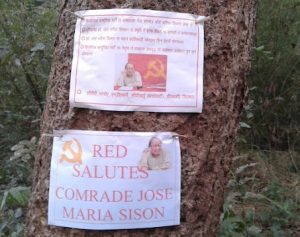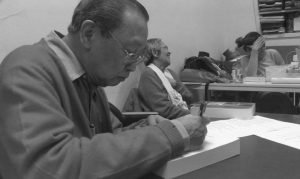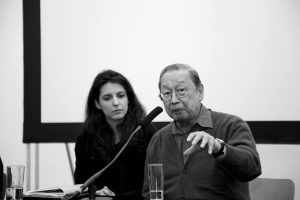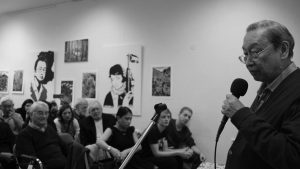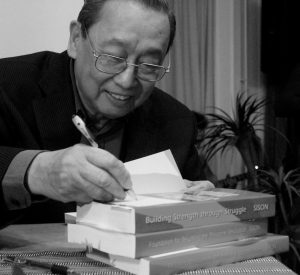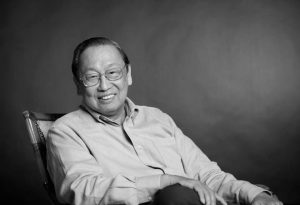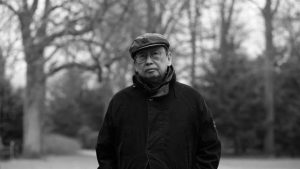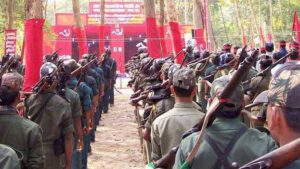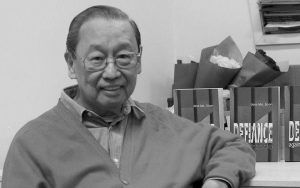“The Guerrilla Is Like a Poet” kites Editorial Committee: Jose Maria Sison, 1939-2022
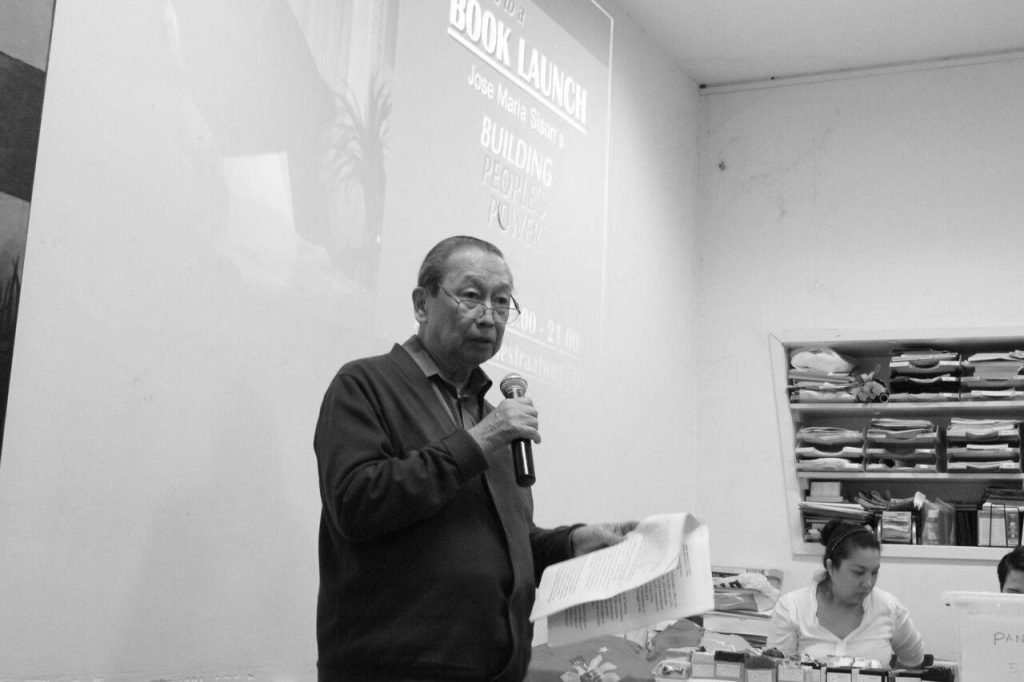
An Obituary by the kites Editorial Committee
Comrade Jose Maria Sison has passed away at the age of 83 after two weeks of hospitalization in his place of forced exile in Utrecht, Netherlands. He lived his whole life in struggle and service to the Filipino people, to the international proletariat, and to the oppressed and struggling peoples of the whole world. Joma, as he was affectionately known, modeled the communist principles of sacrifice, resilience in the face of torture, and an unwillingness to rest content with past accomplishments. From the classroom to the streets, from the countryside to revolutionary diplomacy, wherever he found himself Joma Sison found a way to make his life about advancing the Philippine revolution forward through whatever means he had at his disposal.
As a political leader, comrade Joma’s achievements are remarkable: after being the most influential leader of the radical Philippine student movement in the 1960s, he led a struggle against the revisionists who had made the old Philippine Communist Party (PKP) useless, and re-founded the Communist Party of the Philippines (CPP) in 1968. Established by Joma and his comrades on a revolutionary basis, the CPP firmly placed itself in the camp of Mao Zedong and the Chinese revolution in opposing Soviet revisionism and the lie of peaceful co-existence between capitalism and socialism; and Joma put those principles into practice in founding the New People’s Army (NPA) in 1969. He served as the leader of the CPP as it expanded the reach of the revolution throughout the Philippine archipelago editing the CPP newspaper, and giving guidance to the mass movement in Manila and other cities that were confronting the US-backed dictator Ferdinand Marcos, who had declared martial law in 1972 to combat the growth of the Philippine revolution.
Joma led the CPP until his capture in 1977, where he faced solitary confinement and torture during his incarceration by the fascist Marcos regime, which hoped to use him as a trophy. Instead he found ways to continue serving the revolution, developing clandestine forms of communication with the CPP leadership and smuggling writing out of prison with the aid of his wife and comrade, the Filipina revolutionary Julie de Lima. Released from prison after nine years in 1986, following the fall of the Marcos regime, Joma continued to write and speak on behalf of the revolution, only to have his passport revoked while abroad by the reactionary Philippine government in 1988, forcing him to seek political asylum in the Netherlands. In exile, Sison was the chief political consultant for the National Democratic Front of the Philippines and remained a potent symbol of the persistence of the People’s War in the Philippines, and continued to face harassment. Despite having political refugee status, he was arrested by Dutch authorities in 2007 and briefly held in solitary confinement before a legal and political campaign defeated the trumped up charges.
His comrades in the CPP note that even from exile, Joma was a firm exponent of the CPP’s Second Great Rectification Movement, consulting with CPP leadership, and advising on key political matters of the rectification. More than a symbol of the Philippine revolution, Joma remained a committed proletarian internationalist his whole life. Joma spoke at the founding conference of the International Emergency Committee to Defend the Life of Dr Abimael Guzmán, aka Chairman Gonzalo, the leader of the Communist Party of Peru who had been captured in 1992. And he also spear-headed the founding of the International League of People’s Struggle in 2001, an international united front of hundreds of anti-imperialist mass organizations from across the world, becoming its general consultant from 2001 to 2004 and then serving as its Chairperson from 2004 to 2019.
As a writer, speaker, and poet, Joma leaves behind thousands of articles, interviews, speeches, and lectures. Joma was exemplary at breaking down the key concepts of revolutionary theory and Marxism-Leninism-Maoism to be broadly accessible. His keystone 1971 work Philippine Society and Revolution modeled communist historical materialism in explaining the class forces behind the history and present day reality of the Philippines helping to popularize the national democratic revolution across the archipelago, and is still studied today throughout the Philippine revolutionary movement. His works in the 1970s including Specific Characteristics of Our People’s War and Our Urgent Tasks, are full of both practical guidance and creative application of communist principles and theory.
Even in the face of incarceration, solitary confinement, and torture, Joma was able to contribute to the debates facing the revolution. When revisionist winds entered the CPP and promised a quick victory through abandoning protracted people’s war, Joma insisted that the semi-feudal and semi-colonial character of the Philippines remained—not on the basis of dogmatism, but on the basis of rigorous study of Philippine conditions, and the understanding that semi-feudalism is the social basis of imperialism.
A committed Maoist for his whole political life, Joma was a firm opponent of revisionism, opposing the social-imperialism of the Soviet Union after 1956, and the 1976 counter-revolutionary coup in China. His later writings provide an insightful analysis of the rise of Chinese and Russian imperialism, and the particular threat of Chinese imperialism in the Philippines, while also arguing that the strategic decline of US imperialism poses a favorable situation for the rebirth of revolutionary forces on a world scale.
Joma was also a notable and award winning poet, who marked important occasions in his life with beautiful and moving revolutionary poems about the life of the guerrilla, surviving torture, or marking the 50th anniversary of the founding of the CPP. Perhaps it was his revolutionary persistence and perseverance, in combination with his poetic spirit, that explains his personal warmth. Despite his seriousness of purpose, people who visited him in person often commented on his, hospitality, curiosity, and love of music and singing.
At every stage of his life, Joma could have taken the easy path. He could have settled into the life of a petty-bourgeois professor or intellectual, making his peace with the class inequalities of Philippine society. He could have capitulated into the revisionist PKP and become another hack apparatchik. He could have capitulated to Marcos avoiding years of isolation and torture. He could have accepted one of many offers to order the NPA to put down their guns and joined one of the post-Marcos administrations. He could have settled into a quiet retirement, instead of writing and giving interviews up until the very end of his life. Comrade Joma Sison lived his whole life going against the tide, upholding revolution until the very end.
While we join revolutionaries the whole world over and our Filipino comrades in paying tribute to the life and contributions of Comrade Joma, we know that the best way for us to honor his memory is to swim against the tides of seemingly easy solutions, revisionism, capitulation, and counterrevolution, and live our lives in service of revolution.
While he was facing torture and isolation by the Marcos regime in 1979, Joma wrote the poem Fragments of a Nightmare. This is the last stanza:
But still my pain and suffering is small
As I think of those who suffer more
The violence of daily exploitation
And the rampage of terror on the land.
I belittle my pain and suffering
As I think of the people who fight
For their own redemption and freedom
And avenge the blood of martyrs.
I belittle my pain and suffering
As I hope to give more to the struggle

